Jesse Eisenberg’s When You Finish Saving The World Revisits Some Of His Most Intricate Characters [Exclusive Interview]
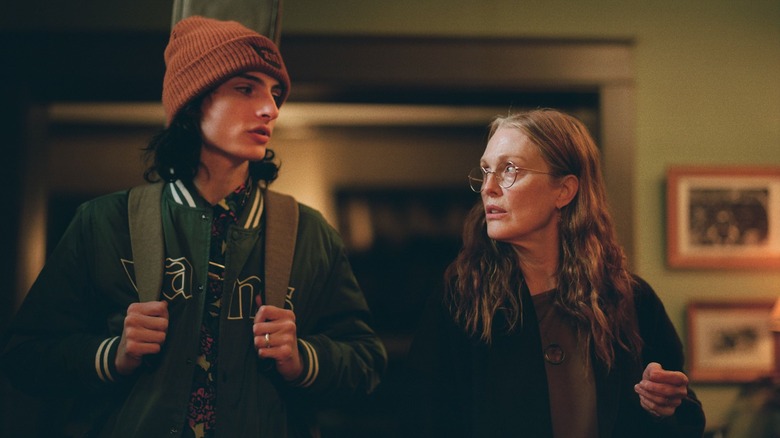
Most coming of age films center solely on the plight of a teenager: the struggles to find love, acceptance, and a whole host of other human necessities being navigated as characters reach adulthood. But the truth is that we continue coming of age until we leave this planet, because there are always going to be illuminating experiences that show us how to put one foot in front of the other in a way we never knew before. In Jesse Eisenberg's directorial debut "When You Finish Saving The World," age is nothing but a number. Buried emotions — and how they give way to seeing things with new eyes — are the key component to solidifying connections, and pulling down the walls we build around us might be the one thing that will save us from ourselves.
"When You Finish Saving The World" follows the story of Ziggy (Finn Wolfhard), a teenage musician who is internet-famous, and Evelyn (Julianne Moore), his slightly guarded mother who has devoted her life to helping domestic violence victims get back on their feet. Though they inhabit the same space, it seems this duo couldn't be further from each other in the mental sense, with their ideals in totally different places and their words nearly whizzing past one another at any given moment. But when Ziggy falls for a politically active classmate and Evelyn takes an interest in the bright son of a shelter resident, they end up figuring out that they have much more to connect on than they previously allowed themselves to access.
Eisenberg's film, which he also wrote, is full of idiosyncrasies that feel like they're part of a greater universe that comprises all his works and all the characters he's created in theater, literature, and now film. His characters feel like Jesse Eisenberg characters, and they are as innately flawed as any of us — but in "When You Finish Saving The World," their salvation comes not with a bang, but a glorious whimper.
Ahead of the release of his latest project, Eisenberg sat down with me to discuss the singular identity of Ziggy Katz, revisiting old characters, and the genius of Julianne Moore's dedication to the acting craft.
Note: This interview has been lightly edited for clarity and brevity.
'I Was Trying To Conceive Of A Kid Who Is So Cut Off From Anything In His Physical World, But Very Engaged In The Online World'
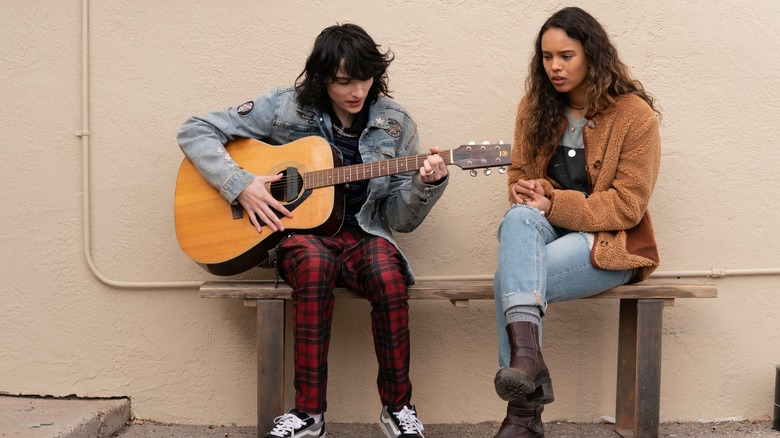
How much of Ziggy's character came from you and how much came from Finn Wolfhard?
I conceived of the character to exist in the year 2032, because this movie started as a book I wrote for Audible. The 'Ziggy at 15' section took place 15 years in the future at the time I wrote it, it was 2032. I was trying to conceive of a kid who is so cut off from anything in his physical world, but very engaged in the online world. So that's where the idea came from, of this kid who is beloved online, has followers from Belarus to Bangladesh, and yet the woman who lives on the same floor as him ignores him and the kids at school think he's a loser.
It came from my thoughts about how people are trending socially, which is more online, less in person. Then just his voice and his lack of self-awareness comes from me aspiring to that because I'm a very self-conscious person. As an actor, I play very smart, articulate people, so when I was conceiving this as an audio book and something that I was planning on performing in, I wanted to conceive of something that was different from me. So I created this voice of this guy who is not that with it, not so self-aware and also not so bright, but well meaning. The irony is that he comes from these incredibly intellectual parents, and he has just completely rejected their ethos, their set of values, and their kind of intelligent pursuits.
'I Have Always Been Interested By Holocaust Tours'
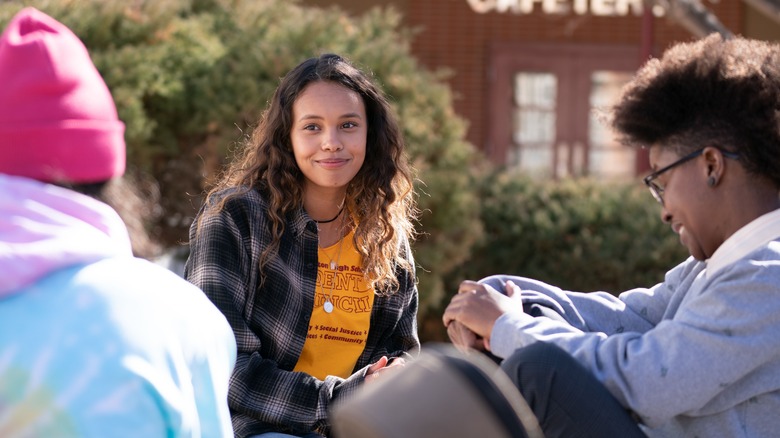
Would you ever revisit any of your previous characters and build a new conflict or a new story for them? I don't think a lot of people maybe realize that this is the same family we're exploring [from the audio book in a] different part of their life, but it's so interesting.
Yes. The next movie I'm making is about these two cousins who've kind of grown estranged, the same age, grown apart, and go to Poland on a Holocaust tour together. They're two characters I used [in my second play, "The Revisionist."] I have always been interested by Holocaust tours and the kind of strange juxtaposition between staying at a nice hotel and then visiting Auschwitz during the day. I thought, "OK, that's a movie too. We need to show what that is."
'I Started Changing What I Was Writing'
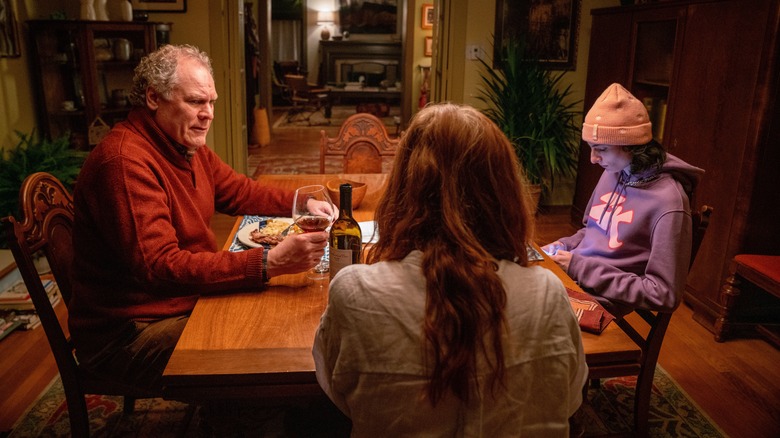
This movie is so full of bits about social justice. It's very clearly a throughline in your work, something that is interesting to you, something you enjoy writing about. What makes you want to highlight people who choose to spend their lives in social service or, further, people who can't figure out how to naturally assimilate into those roles?
I think probably what it was is the first date I ever went on was with the person I'm married to. While I was trying to get her to like me, I was giving her everything I was writing at the time. I gave her a screenplay that I had written, and she returned the screenplay two days later with half the pages folded. I said, "What are all the folds?" and she goes, "That's where you wrote anything offensive." I looked through the pages, and I was like, "Oh my God. She has a very low bar for things that offend her." I asked her, "Why is this offensive?" and she just talked me through everything that I was ignorant of. I started changing what I was writing. Instead of focusing on things that just made me chuckle, often maybe that were maybe just obnoxious and juvenile, I started writing things that had kind of meaning to me, to her, and to the ethics that I aspire to.
'The Two Of Them Are Trying To Find Value In Each Other's Work'
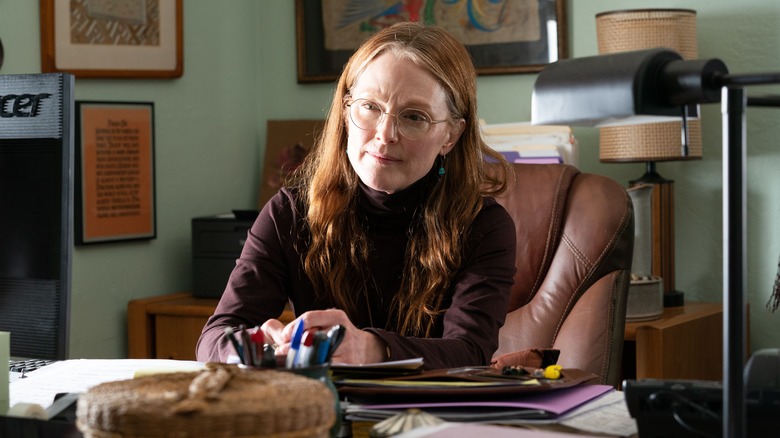
Because I live in a weird kind of very vain world, which is to say being an actor and being kind of celebrated in an unearned way and being allotted in a way that feels disproportionate to the good that I do, I struggle with ... I try to create stories that present that struggle. So here you have a kid in this movie who is an artist who's very popular and a mother who has devoted her life to social justice. The two of them are trying to find value in each other's work. It's what I, in some ways, as the mother who Julianne Moore plays, as she comes around to seeing the value that her kid has, it's a little bit of me patting myself on the shoulder and saying, "Your work has value, even though it's not social justice." And also acknowledging that the arts should understand their place and recognize that there are jobs that are more important even though you get celebrated and given awards.
I love that you mentioned in the production notes that Julianne Moore has this raw talent to sustain a story with essential gestures, because gestures are my personal favorite part of building a character. Is there one of her Evelyn gestures that sort of sticks out at you as being one that you felt was maybe intrinsically connected to the heart of this character, but maybe something you guys never discussed?
She does this thing with her glasses all the time where she's readjusting her glasses. I was just pleased that it's kind of interesting to watch and then thinking about what the meaning is and how the gestures we make indicate what's going on inside. She plays a character who's very socially guarded and at the same time insecure. What better expression of that is to adjust the shield on your face in an insecure way?
'I Literally Decided To Make It Into A Film Because I Wanted This Story To Have Multiple Rooms'
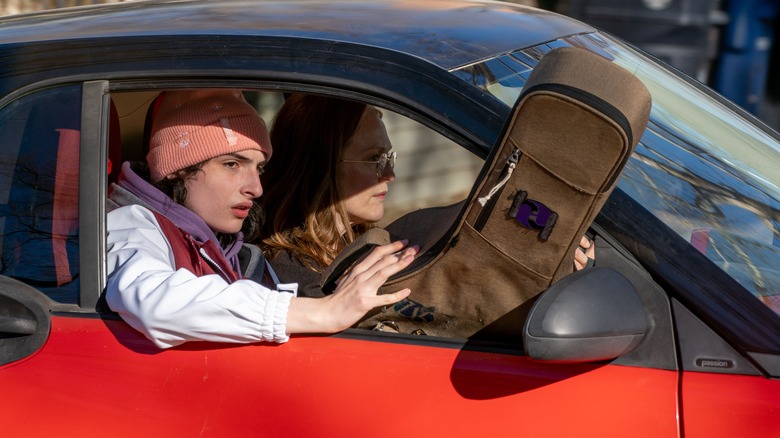
So it was funny, when the editor and I were cutting the movie, it was like, how many times could we afford to put this wonderful little moment in? Because we've put it in too many times and becomes self-conscious. But she's just full of that. I think an actor of her caliber, status, and experience, I think probably it comes naturally. I don't think she's probably thinking of it in a conscious way. I think she gets glasses, feels them on her face, and thinking about the psychology of the character, ends up manifesting in that gesture. I think that's probably how she's working, how most people who are probably have done it a million times.
What made you want to take the leap into film in this way? Was it just that it was the last performance medium of this type that you haven't explored as a writer-creator, or was there something else there?
I literally decided to make it into a film because I wanted this story to have multiple rooms. So my background as a writer is in playwriting. All my plays take place on what you call a single set kind of play. When I was thinking about this story, it occurred to me that it would be so wonderful to show the inside of a domestic violence shelter, a place I know a lot about, but haven't seen a lot in films. It would also be so wonderful to see this young man's app, the world of his app, which is called High Hat, kind of a TikTok analog, and I thought, "God, it would be so interesting to juxtapose those two things," and it's just impossible to do in theater. Where once you have a screen in theater, the audience just loses ... there's no good way. No one's cracked the code yet on making a screen fun to watch in theater. Similarly, to show the insight of a domestic violence shelter is possible, but then that's your set and you can't go home. I say this all to say that it was no aspiration to be a great filmmaker or even to direct a movie, but this is where the story took me.
"When You Finish Saving The World" premieres in theaters in the United States on January 20, 2023.
Read this next: The 14 Best Film Acting Debuts Of All Time
The post Jesse Eisenberg's When You Finish Saving The World Revisits Some of His Most Intricate Characters [Exclusive Interview] appeared first on /Film.